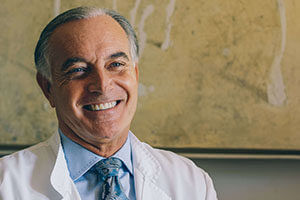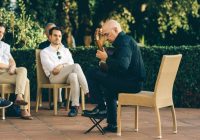TIME TO FAST
Fasting: A historic, religious and medical tradition
Fasting offers the body and mind a break from stress and a chance to regenerate: At Buchinger Wilhelmi clinics you can fast for several days and return to your everyday life with a fresh energy boost. Fasting is the physiological ability of humans and animals to switch to using their fat reserves when food is scarce. Fasting also has a long tradition in all world religions, and the therapeutic effects of long-term and short-term fasting are used in various natural remedies. In the following, we discuss different fasting periods and tell you more about therapeutic fasting as practised at our Buchinger Wilhelmi clinics.
A brief history of fasting
There have always been times of abstinence, whether voluntary or involuntary. Our ancestors rarely had enough to eat day and night, summer and winter, as we do today. When people were hunters and gatherers, they had to manage with having less food in certain seasons, or sometimes none at all. In such times of food shortage, the human body can draw on its own reserves as a source of energy. By switching to a fasting metabolism, it is possible to bridge several weeks without food. But back in those days, fasting had nothing to do with conscious abstention, but was rather an essential and regular feature of life.
It was only later that people could voluntarily choose when to fast. There is evidence that fasting was already practised in ancient Egypt and the Roman Empire. The Greek physician Hippocrates is said to have recommended fasting as a therapeutic remedy. He is also credited with the quote: “To stay strong, young and healthy, do everything in moderation, exercise the body, breathe clean air and heal your ailments through fasting rather than medication.”
Religious fasting periods.
Fasting is also integral to many religions and is practised for different lengths of time and with varying intensity. We summarise some religious fasting periods below.
Christian fasting.
The Christian fasting period of Lent reminds us of the 40 days when Jesus fasted in the desert to prepare for his mission. For Christians today, the Lenten season is a time to prepare for Easter by reflecting consciously on their own behaviour over the past year and repenting. Lent means giving things up to focus on and create space for faith. Lent is observed by Protestants, Catholics and Orthodox Christians. It generally begins 40 days before Easter and ends on Easter Sunday. Over time, the start of Lent has been brought forward to Ash Wednesday. This is because Sundays were introduced as a break from fasting, so it was no longer possible to fast for 40 days without moving the start of Lent.
In 2025, Lent begins on 5 March and ends on 19 April, which is Easter Sunday.
Nowadays, there are various ways to abstain during Lent. Most people no longer completely give up food for the entire period. Some choose to do without treats such as sweets, meat, alcohol or cigarettes. Abstinence can also apply to social media, TV or other everyday distractions. There are no longer any clear rules. For some years now, a number of communities have organised a week of “Buchinger-style fasting for healthy people”. But this has relatively little to do with medical fasting as practised at Buchinger Wilhelmi. In the fasting clinics established by Dr Otto Buchinger, therapeutic fasting encompasses three dimensions: the medical and therapeutic dimension, the spiritual dimension, and the interpersonal dimension.
Islamic fasting.
In Islam, the period of fasting is called Ramadan – the ninth month of the Islamic year. The date on which it starts moves forward a little each year.
Next year, Ramadan begins on 28 February and ends on 29 March.
Again, the purpose of fasting is to reflect on faith: Believers pray a lot and everyday life is also restricted to some extent: People should not argue or have sexual intercourse, and shops often close earlier. Religious topics are also discussed more in the media. But fasting also serves to cleanse the body and soul. Because Muslims experience Ramadan in the community, they often celebrate breaking their fast with the family. Ramadan is obligatory for Muslims, with only a few exceptions for health reasons. Although people generally observe Ramadan, they do not strictly follow the dietary rules. These prescribe eating only dates, milk and simple dishes with the traditional soup, shorba. Instead, many people choose rich, sweet and fatty foods in the evening and at night, which can diminish the health benefits of fasting.
Fasting in Hinduism, Judaism and Buddhism.
- Other religions also have fasting rituals. In Hinduism, for example, fasting is also practised on specific days. Some groups, such as the Jains, also fast for longer.
- There are several days of fasting in Judaism, the strictest being Yom Kippur. However, fasting never lasts longer than 25 hours. There is therefore no tradition of fasting for several weeks, as in Christianity or Islam.
- There are no fasting days in Buddhism, but abstinence plays an important role. It is more about balance, as Buddha rejected extremes. For example, some Buddhists eat less before meditating in order to focus better.
Therapeutic fasting at Buchinger Wilhelmi
At Buchinger Wilhelmi, guests follow the therapeutic fasting method developed by our founder Dr. Otto Buchinger. In 1935 he published his book “The Therapeutic Fasting Cure” that is still considered one of the most important works on fasting today. He considered fasting as having three dimensions: a medical and physical dimension, a spiritual and emotional dimension, and an interpersonal dimension. Fasting in accordance with the Buchinger Wilhelmi method is done under medical supervision. It is being continuously developed and its preventive and therapeutic effects documented in scientific studies by our research department.
There are some similarities between religious fasting and therapeutic fasting, such as reflection, rest, a time-out for the body and soul, and the importance of being part of a community. Above all the idea of pausing and looking inwards can be found in both approaches.
At our clinics, fasting is possible at any time and not just during religious fasting periods. Our international guests come here primarily to improve their health and quality of life.
Dr. Françoise Wilhelmi de Toledo,
fasting physician and head of our
scientific department, describes our approach in a nutshell:
“The right time to fast is when we decide to do it,
have time, are prepared to follow the rules
and rituals and turn our attention inwards.”
Find out more about therapeutic fasting according to the Buchinger Wilhelmi method and its scientifically proven effects:
The difference to medical fasting.
In medical fasting, people intentionally abstain from food for a limited period of time. A religious motivation is not key to this but is always present.
Medical fasting is about
- improving your health
- activating the body’s self-healing powers and
- ageing healthily.
Medical fasting is on the one hand a preventive measure to live a long, healthy life. Risk factors such as obesity, high blood pressure, type 2 diabetes, hypercholesterinaemia and smoking, a lack of exercise and stress can be prevented by fasting. But fasting can also help with various diseases, including joint disorders and rheumatism, chronic digestive disorders, migraines and much more. Find out about the most common indications here.
Ultimately, fasting should lead to a greater sense of well-being (physical and mental) and can, of course, be done regardless of one’s religious confession. Often, it is a good way to break undesired behaviour patterns. Medical fasting is not linked to a specific period – you can fast any time you like.
💡Incidentally, guests at our clinics who do not want to or cannot fast are served a diet tailored to their needs from our organic gourmet cuisine.
Would you like more information or a non-binding enquiry? We look forward to hearing from you!










